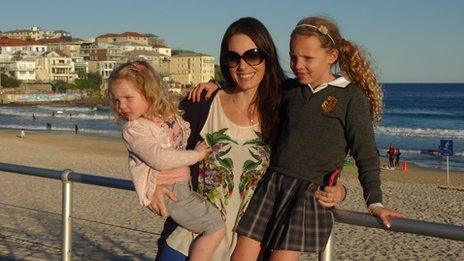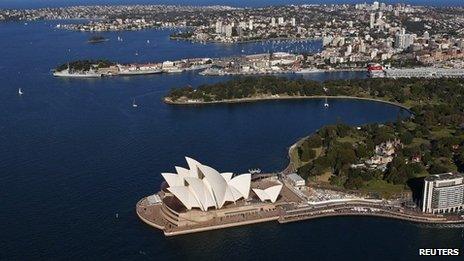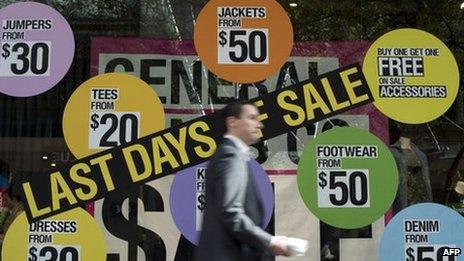Why living costs worry Australian voters
- Published

Kendall Hayes says her family live a simple life to pay the bills
On a perfect winter day, an average Australian is walking along the Bondi waterfront.
Her name is Kendall Hayes, and she is being entertained by her two little girls on their scooters, dodging in and out of the afternoon joggers.
Ms Hayes is not the perfect, average Australian, but according to Australia's Bureau of Statistics she is pretty close.
The bureau defines the average as a married woman living with her husband and two children in a three-bedroom house in the suburbs of a state capital city. She has a mortgage and works as a sales assistant.
Everyone knows averages can be hard to find and at 40, Ms Hayes is slightly older than the statistical average of 37, but she ticks the rest of the boxes. Together with her husband, she runs a successful health food business in Sydney.
On paper Ms Hayes has a comfortable life, but in reality, she finds it a challenge.
"It's tough," she said. "I don't spend a lot of money on clothes and going out at night, expensive restaurants.
"I mean we live really simply so we can pay the mortgage, the power bills, and the food bills… really there's not a lot left over at the end of the month."
And despite having a job and a business, she is not sure what lies ahead. "There's definitely a level of uncertainty, I don't really feel financially secure."
'Sales declining'
Ms Hayes is like millions of other Australians who worry about the future, and yet she lives in a country which has had more than two decades of uninterrupted economic growth.
Unemployment is a relatively low 5.7%, inflation is low and interest rates are low. So it seems fair to ask: why is she so cautious?
Part of the answer is high prices. It costs a lot to live in Australia, especially in Sydney, which regularly rates in the top 10 most expensive cities in the world.

Life in Sydney costs a lot, international surveys show
"In a way Australians have become victims of their own success and that's made Australia a more expensive place than it used to be," says Adam Boyton, chief economist with Deutsche Bank Australia.
"Australia has really outperformed the rest of the world for the past 10 years, and when the economy's strong and people are relatively wealthy, prices can go up, because prices are not just a function of costs, they're a function of your ability to pay."
And when prices go up, people adjust their behaviour. Ms Hayes said she can see the effects in Sydney's central business district, where she looks after the cash register at the family cafe.
"I see a lot of shops that are closed, lots of for lease signs. And I see sales declining in my store."
She said more businesses are moving out of the city to the suburbs where rents are cheaper, and they are taking their employees with them. And that means fewer people buying lunch.
It is only anecdotal evidence, but her worries certainly reflect a more general unease in Australia, which does not sit comfortably with the country's economic performance.
'Paralysis'
High prices are one reason for that unease, but there is another - three years of minority government.
Australia's Labor Party holds power through an alliance with a handful of independents and the Greens. In a challenging political environment both the government and the opposition have made the economy their battleground.
Their very public debates about debt and deficits leave many people confused about who is right, and it is not easy to get a clear picture of the health of the nation's finances.
The claims and counter-claims about the state of the nation are especially confusing against the backdrop of a mining boom that is coming to an end, and the need to transition to new sources of jobs and growth.

Australian consumers are said to be conservative in their spending habits
"Australians are in a state of paralysis and have been over the last three years," said Bernard Salt, a demographer with KPMG, who has been charting the national mood for decades.
"It's almost as if they're waiting for some trigger event, hopefully the election, for Australians and the Australian economy to be rebooted."
And Mr Salt says the end result is a nation where wallets are firmly shut.
"As I travel around Australia, the feedback from business is that consumers have money to spend, but they have absolutely no confidence in the future.
"People seem to be saving for a rainy day, they're more cautious, there's talk about the frugal consumer, people moving into an era of austerity. People without confidence in the future don't spend."
The 7 September election may trigger a change of national mood. And there may soon be some good news too on prices. Deutsche Bank's Adam Boyton says the cost of living should start coming down.
"I think Australia will actually get cheaper over the next few years as the mining boom comes off, as the dollar weakens, they're the sorts of things that will see Australia fall down those global expense league tables," he said.
But even with lower prices and a new government, average Australians like Kendall Hayes may well stay cautious. It is a hard habit to break.